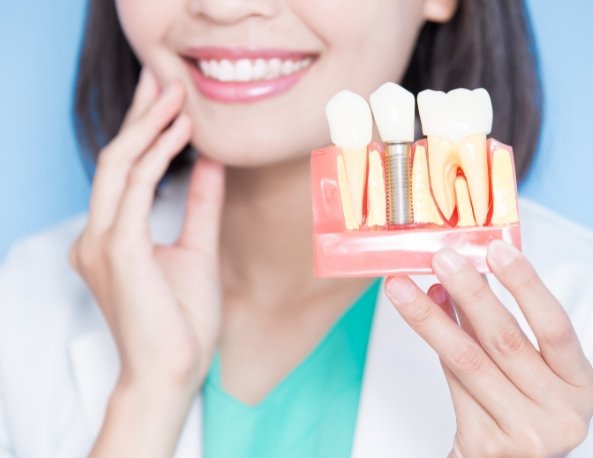Dental Implants
A Permanent, Natural-Looking Solution for Missing Teeth
Tooth loss can affect your smile, speech, confidence, and ability to chew comfortably. At Dental Designs, we offer advanced dental implant solutions that closely replicate natural teeth—both in function and appearance.
Dental implants are widely regarded as the gold standard in tooth replacement, and we work with globally trusted implant systems to deliver predictable, long-lasting results.
What Is a Dental Implant?
A dental implant is a small, tapered titanium post that is precisely positioned into the jawbone to replace the root of a missing tooth. Once integrated with the bone, it provides a strong foundation for a crown, bridge, or denture, restoring both aesthetics and function.
Because the implant fuses with the bone over time, it becomes a stable and long-lasting part of your dental structure—almost like a natural tooth root.
Types of Dental Implants: Osseo integrated & Basal Bone Implants
Dental implants are a trusted, long-term solution for replacing missing teeth. They restore function, improve appearance, and preserve bone health. At Dental Designs, we offer both Osseo integrated implants and basal bone implants, based on individual needs and bone conditions.
-
Osseo integrated Dental Implants (Conventional Implants)
These are the most commonly used implants, placed in areas where there is good bone height and density.
How it works: The implant integrates naturally with the jawbone over a few months — a process called osseointegration — creating a stable foundation for crowns, bridges, or dentures.
Indications:
- Single or multiple missing teeth
- Patients with good jawbone volume and healthy gums
- Full mouth rehabilitation in well-healed bone
- Ideal when time and bone grafting are not constraints
Commonly used brands at Dental Designs:
- Straumann (Switzerland) – premium Swiss design, high long-term success
- Nobel Biocare – global leader in advanced implant solutions
- Alpha Bio – cost-effective and reliable for many cases
- GMI Frontier – versatile and used in both routine and complex cases
-
Basal Bone Implants (Basal or Cortical Implants)
Basal implants are designed to anchor into the basal (cortical) bone — a dense, stable part of the jawbone — often used in patients with reduced bone height or compromised bone.
How it works: Unlike conventional implants that rely on the spongy upper jawbone, basal implants are placed deeper into the strong basal bone, often allowing for immediate loading, meaning teeth can be fixed faster.
Indications:
- Severely resorbed jawbones where bone grafting is not feasible
- Diabetic or medically compromised patients (case-specific)
- Patients seeking immediate teeth replacement with minimal delay
- Full mouth rehabilitation without sinus lifts or bone grafts
Advantages:
- Avoids complex surgeries like bone grafting or sinus lifts
- Faster results — teeth can be fixed within a few days
- Works well in cases with poor bone volume
- High success in elderly or medically challenged patients
Common brands used:
- Simpladent / BCS – leading in basal implantology
- IHDE Dental – well-known for immediate loading and flapless placement
- Mondeal – versatile use in minimal bone conditions
Which Implant is Right for You?
At Dental Designs, we perform a detailed assessment using advanced diagnostics and 3D imaging to determine the best implant type based on your bone health, medical condition, aesthetic needs, and time availability.
We ensure safety, quality, and comfort throughout your implant journey — from consultation to final tooth restoration.
Premium Implant Systems We Use
At Dental Designs, we use leading global brands known for their reliability, innovation, and clinical success:
- Nobel Biocare
- Straumann
- Alpha-Bio Tec
- GMI Frontier
Each system is selected based on your bone quality, oral condition, and restoration goals to ensure the best outcome.
The Dental Implant Procedure – Step by Step
- 1. Consultation & Planning: We begin with a comprehensive assessment using digital X-rays, 3D scans, and clinical photographs. Based on your needs, we create a customized treatment plan using the most suitable implant system.
- 2. Implant Placement: The implant post is carefully placed into the jawbone under local anaesthesia. This minor surgical procedure is done with precision to minimize discomfort and healing time.
- 3. Healing & Osseointegration: Over the next 3 to 6 months, the implant naturally bonds with the surrounding bone—a process called osseointegration. This creates a stable, long-lasting base for your restoration.
- 4. Abutment & Final Restoration: After integration, a small connector (abutment) is attached to the implant, followed by a custom-crafted ceramic crown, bridge, or denture. The final result is indistinguishable from your natural teeth.
Types of Dental Implant Treatments
- Single Tooth Implants – Ideal for replacing one missing tooth
- Implant Bridges – Restore multiple missing teeth with fewer implants
- Full-Arch Solutions (All-on-4/All-on-6) – Fixed replacement for a complete arch of teeth
- Implant-Supported Dentures – Greater comfort and stability than traditional dentures
Why Choose Dental Implants?
- Permanent and reliable tooth replacement
- Looks, feels, and functions like natural teeth
- Prevents bone loss and supports facial structure
- Does not affect adjacent teeth
- Allows confident eating, smiling, and speaking
- Long-term solution with high success rates
Long-Term Care & Maintenance
With regular brushing, flossing, and professional cleanings, dental implants can last 15–20 years or longer. They do not decay like natural teeth, but the surrounding gum and bone must be kept healthy for long-term success.
Smile Naturally. Live Confidently.
At Dental Designs, our expertise in implant dentistry—combined with advanced diagnostics and premium systems like Nobel Biocare, Straumann, Alpha-Bio, and GMI Frontier—ensures safe, precise, and lasting results.
If you’ve lost a tooth or are considering long-term replacement options, dental implants could be the most natural and effective solution for you.
Dental Implants vs. Dental Bridges – What’s the Difference?
Both implants and bridges are used to replace missing teeth, but they differ in structure, longevity, and maintenance. Here’s a quick comparison to help you understand your options:
| Feature |
Dental Implants |
Dental Bridges |
| Tooth Preservation |
No alteration to neighbouring teeth |
Requires grinding down adjacent teeth |
| Longevity |
15–20 years or more (often lifelong) |
Typically, 7–10 years |
| Bone Health |
Prevents bone loss by stimulating jawbone |
Does not prevent bone loss |
| Cleaning |
Brushed and flossed like natural teeth |
Special cleaning under the bridge needed |
| Comfort |
Feels and functions like a natural tooth |
May feel slightly different than natural teeth |
| Aesthetics |
Highly natural appearance with customized crown |
Natural look, but less precise contour |
| Cost (Initial) |
Higher upfront cost |
Lower upfront cost |
| Cost (Long Term) |
More cost-effective over time due to longevity |
May require replacement or repair |
Post-Implant Care Guide
Proper care is essential to ensure the long-term success of your implant. Here are some simple steps to follow after placement:
Immediately After Surgery:
- Bite on gauze to control bleeding (for 30–45 minutes)
- Apply cold compresses for the first 24 hours to minimize swelling
- Avoid hot food, smoking, spitting, or drinking with a straw for at least 24 hours
- Stick to soft foods and avoid chewing near the surgical site
For Ongoing Care:
- Brush and floss gently around the implant with a soft brush
- Use non-abrasive toothpaste and consider an antimicrobial mouthwash if advised
- Schedule regular cleanings and checkups—just like natural teeth
- Consider a night guard if you grind your teeth
With good hygiene and regular dental follow-ups, implants can function comfortably and look great for many years.
Cost & Financing Options
How Much Do Dental Implants Cost?
The cost of dental implants can vary based on several factors:
- Number of implants needed
- Type of restoration (crown, bridge, full-arch)
- Bone grafting or sinus lift, if required
- Brand of implant system used (e.g., Nobel Biocare, Straumann, Alpha-Bio, GMI Frontier)
While implants have a slightly higher upfront cost, their durability and minimal maintenance often make them more cost-effective in the long run compared to bridges or dentures.
Financing & Payment Flexibility
At Dental Designs, we aim to make quality implant care accessible:
- Transparent pricing with detailed treatment estimates
- Payment plans available for phased treatments
- Guidance on dental insurance coverage, if applicable
We’ll work with you to find the most affordable solution that fits your needs—without compromising on quality or safety.
Begin Your Journey to a Stronger, Healthier Smile
If you’re ready to explore long-term solutions for missing teeth, book your consultation with Dental Designs. Our expert team will walk you through your options, design a personalized treatment plan, and ensure you feel confident every step of the way.
IMPLANT-SUPPORTED DENTURES
Stability. Comfort. Confidence.
If you’re tired of loose, uncomfortable dentures or struggling with missing teeth, implant-supported dentures offer a secure, long-lasting solution. At Dental Designs, we combine the benefits of modern dental implants with customized denture design to restore your smile’s function, aesthetics, and comfort—without the slipping, clicking, or embarrassment of traditional dentures.
What Are Implant-Supported Dentures?
Unlike conventional dentures that rest on the gums, implant-supported dentures are anchored onto 2 to 6 dental implants placed in the jawbone. These implants act as artificial roots, providing firm support for a removable or fixed denture that stays in place while eating, speaking, and smiling.
They are ideal for patients who:
- Have lost all or most of their teeth
- Want greater security than removable dentures
- Have sufficient bone in the jaw (or are eligible for bone grafting if needed)
- Seek a more natural, functional, and confident smile
Types of Implant-Supported Dentures
- Removable Implant-Supported Dentures: Also called overdentures, these snap securely onto implants and can be taken out for cleaning. They offer improved retention and comfort compared to traditional dentures.
- Fixed Full-Arch Implant Prosthesis (All-on-4 / All-on-6): A permanent option where a full set of teeth is fixed onto 4 or 6 implants per arch. These are not removed daily and feel closest to natural teeth.
Benefits of Implant-Supported Dentures
- Superior stability – No more slipping or movement
- Improved chewing ability – Enjoy your favorite foods again
- Preserves jawbone health and facial structure
- Enhances speech clarity and eliminates clicking sounds
- Natural appearance with excellent gum fit and smile design
- Greater confidence in social situations
- Can be designed as removable or fixed, based on your needs and preference
How the Process Works
- 1. Consultation & Evaluation: We assess your oral health and bone levels using digital scans. A personalized plan is created based on the number of implants needed and the desired denture design.
- 2. Implant Placement: Using premium implant systems like Nobel Biocare, Straumann, Alpha-Bio, and GMI Frontier, titanium implants are gently placed into the jawbone under local anaesthesia.
- 3. Healing & Integration: Over the next 3–6 months, the implants fuse naturally with your bone (osseointegration), creating a strong, permanent foundation.
- 4. Denture Attachment: Once healed, your custom denture—crafted for aesthetics, bite, and fit—is securely connected to the implants. You can smile, eat, and speak freely without fear of movement or discomfort.
Maintenance & Care
- For removable overdentures, take them out daily to clean the denture and implant attachments
- Fixed dentures are brushed like natural teeth and may require floss threaders or water flossers for hygiene
- Maintain regular dental check-ups and professional cleanings every 6 months
- Avoid using your denture to bite hard substances or open packets
Regain Control of Your Smile
If you’re looking for a reliable, comfortable alternative to traditional dentures, implant-supported dentures at Dental Designs could be life-changing. They restore your ability to eat, speak, and smile with complete confidence—giving you the freedom to live fully again.






